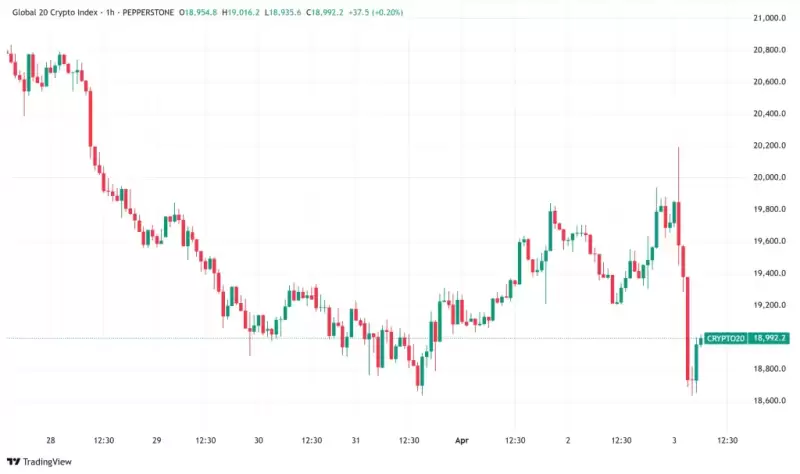 |
|
 |
|
 |
|
 |
|
 |
|
 |
|
 |
|
 |
|
 |
|
 |
|
 |
|
 |
|
 |
|
 |
|
 |
|
Cryptocurrency News Articles
PDVSA Leverages Digital Currencies Amid Renewed US Oil Sanctions
Apr 23, 2024 at 05:41 pm
Amidst renewed US oil sanctions, Venezuela's PDVSA plans to enhance cryptocurrency reliance for crude exports. Since last year, PDVSA has shifted oil sales to USDT (Tether), aiming to mitigate risks associated with frozen sale proceeds. Despite the US dollar remaining the preferred global oil currency, PDVSA has implemented a contract model requiring 50% prepayment in USDT for spot oil deals. The increasing use of intermediaries to facilitate USDT transactions allows PDVSA to circumvent sanctions but may result in reduced revenues.

Venezuela's PDVSA Embraces Digital Currencies Amid Renewed US Oil Sanctions
In the face of reimposed US oil sanctions, Venezuela's state-owned oil company PDVSA is bolstering its reliance on digital currencies, particularly Tether (USDT), to mitigate the impact on its crude and fuel exports. This strategic shift marks a notable escalation in PDVSA's efforts to circumvent financial restrictions and sustain its oil operations.
US Sanctions Tighten the Screws on Venezuela
The US Treasury Department's recent decision not to renew a general license for PDVSA customers and providers has dealt a blow to Venezuela's oil industry. The deadline of May 31st gives companies a limited window to wind down transactions, creating significant challenges for PDVSA's revenue streams. The need to obtain individual US authorizations for business dealings with Venezuela further complicates the situation.
PDVSA's Digital Currency Pivot
Since 2022, PDVSA has steadily increased its reliance on USDT in oil sales. This shift has gained momentum with the reinstatement of oil sanctions, as PDVSA seeks to minimize the risk of frozen assets in foreign bank accounts. PDVSA's strategy involves shifting spot oil deals to a contract model that mandates prepayment for half of each cargo's value in USDT.
Tether's Growing Popularity in Oil Trade
Despite the prevalence of the US dollar in global oil transactions, PDVSA's adoption of USDT underscores the growing appeal of digital currencies in this sector. Tether, a stablecoin pegged to the US dollar, has emerged as a preferred payment method due to its ability to bypass banking compliance hurdles that often arise in the wake of sanctions.
Middlemen Play a Crucial Role
While PDVSA's shift to digital currencies provides a lifeline for its oil exports, it also entails increased reliance on intermediaries. This reliance has the potential to diminish the amount of oil revenue reaching PDVSA's coffers. However, Minister Pedro Tellechea remains optimistic, stating that PDVSA possesses "a big strength in trading" and is ready to adapt to the new sanctions regime.
Industry Analysts Express Cautious Optimism
Oil analysts acknowledge the potential for digital currencies to alleviate some of the pressure from US sanctions. However, they also predict that Venezuela's oil output, exports, and revenue will eventually reach a ceiling, even with timely individual authorizations from Washington. The use of Tether, despite its popularity among crypto users and others seeking to avoid traditional financial institutions, has raised concerns about its potential role in money laundering, according to the United Nations.
Tether's Market Dominance and Controversies
Tether, with a market capitalization exceeding $100 billion, stands as the world's leading stablecoin. Its popularity stems from its ability to mitigate cryptocurrency volatility, but it has also drawn scrutiny due to concerns about its transparency and reserves. The United Nations' recent warning about its use in money laundering further adds to Tether's checkered reputation.
Venezuela Embraces Cryptocurrencies to Counter Sanctions
Venezuela's PDVSA is not alone in embracing cryptocurrencies to circumvent sanctions. Iran, another country facing severe economic restrictions, has also explored digital currencies as a means of sustenance. PDVSA's strategic shift serves as a testament to the growing role of cryptocurrencies in challenging traditional financial systems and facilitating international trade, albeit with potential risks and uncertainties still looming.
Disclaimer:info@kdj.com
The information provided is not trading advice. kdj.com does not assume any responsibility for any investments made based on the information provided in this article. Cryptocurrencies are highly volatile and it is highly recommended that you invest with caution after thorough research!
If you believe that the content used on this website infringes your copyright, please contact us immediately (info@kdj.com) and we will delete it promptly.
-

-

- Daily Crypto Signals: Bitcoin Tumbles from $88.5K, XRP Awaits Ripple Effects of New Trump Tariffs
- Apr 03, 2025 at 10:30 am
- The cryptocurrency market displayed a mixed landscape on April 2nd, 2025, as Bitcoin, Ethereum, XRP, and other altcoins grappled with the ripple effects of newly announced US tariffs
-

-

-

- Bitcoin (BTC) ETFs Extend Losing Streak With $158M Exit, Marking Three Straight Days of Declines
- Apr 03, 2025 at 10:20 am
- The bleeding continued for bitcoin ETFs on the first day of April, with a 3rd straight day of outflows. The hefty $157.64 million exit reinforced bearish sentiment in the crypto ETF space.
-

-

-

-

- Fidelity Investments introduces an individual retirement account (IRA) that permits private investors to invest in cryptocurrencies
- Apr 03, 2025 at 10:10 am
- According to the company's website, investors can add virtual assets to their retirement portfolio through Fidelity Crypto for IRAs. However, only Bitcoin, Ether, and Litecoin are the assets available now.




























































